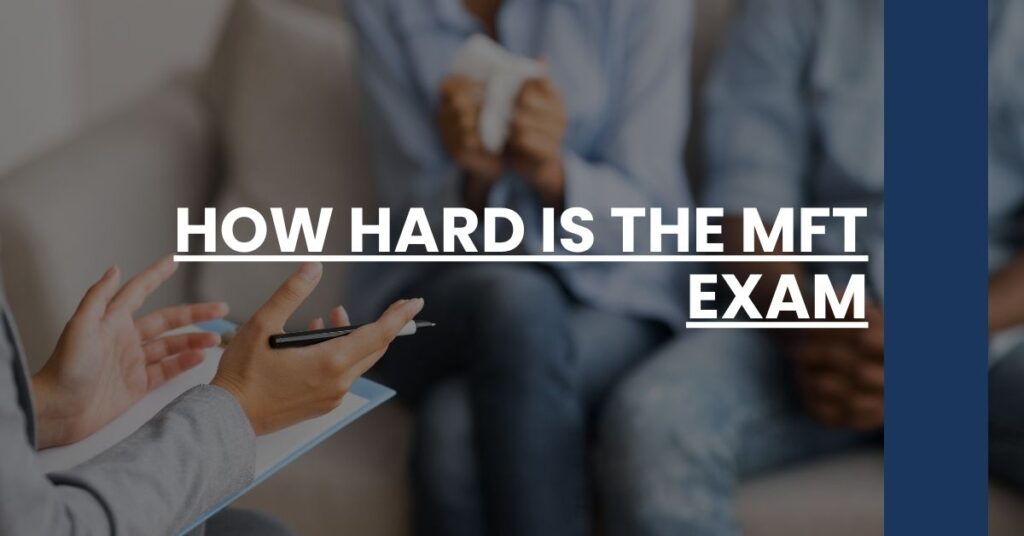The MFT Exam, essential for aspiring marriage and family therapists, is infamously challenging due to its broad scope and the high critical thinking level required. It’s a formidable test, encompassing a myriad of topics from key practice domains and demanding a meticulous understanding of both theoretical and practical applications in therapy.
Yet, with the right approach, preparing for the exam can be tackled effectively. This article arms you with:
- The crucial subjects covered
- Strategies that streamline studying
- Resources to enhance preparation
Understanding how hard the MFT exam is merely the first step—conquering it is next, and we’re here to guide you on that journey.
Understanding the MFT Exam
When you’re on the cusp of qualifying as a Marriage and Family Therapist (MFT), it’s natural to ask, “How hard is the MFT exam, and what should I expect?” Known officially as the Marriage and Family Therapy National Examination, the MFT exam serves as a gatekeeper for the profession, assessing whether you possess the knowledge and competency required for entry-level practice. Administered by the Association of Marital & Family Therapy Regulatory Boards (AMFTRB), it’s the final hurdle in a challenging journey of academic study, clinical practice, and personal growth.
This licensing exam is not just about memorizing facts; it tests your ability to apply theoretical knowledge to practical situations. You have invested years into your education — now, it’s time to put that knowledge to the test, quite literally. Let’s dive into what makes the MFT exam a rigorous assessment for even the most diligent of candidates.
Exam Requirements and Eligibility
Before you set foot in the examination room, you’ll need to have a clear understanding of the eligibility requirements. These are the gates you must pass through before you may even consider tackling the exam itself. Firstly, make sure you have completed a qualifying Master’s or Doctoral degree in Marriage and Family Therapy from an accredited institution.
Your journey will then lead you to accumulate a significant number of supervised clinical hours—these vary by state, so check with your local MFT board. Finally, once you have your supervised experience under your belt and you’ve registered as an Associate MFT, your state regulatory board will give you an Approval Code, signaling that you’re ready to sit for the exam. Every step in this process is designed to ensure that you’re thoroughly prepared for the challenges ahead.
Breakdown of the Exam Content
If the MFT exam were a book, it would be a dense tome covering an expansive library of knowledge. You’re looking at a spectrum of content ranging from Theoretical Foundations to Clinical Practice. This meticulous exam is crafted to test your understanding across several domains of therapy, including human development, ethical and legal standards, and methods of assessment and diagnosis.
To give you a concrete idea, you’ll encounter questions on everything from family dynamics and psychopathology to treatment plans and therapeutic techniques. Every question is an opportunity to demonstrate that you can not only recall information but also apply it critically. As you prepare, keep in mind that your comprehension of these topics will be the foundation upon which you build your aptitude for passing this challenging exam.
Exam Format and Structure
Now, let’s dissect the structure of this formidable exam. Imagine sitting down at the computer and facing 180 multiple-choice questions, each one a puzzle piece of clinical scenarios and theoretical questions. You’ll have a fixed time slot to complete the test, typically four hours, which means time management will be just as critical as your grasp of the subject matter.
This isn’t just any multiple-choice test; it’s computer-based and adaptive, meaning the difficulty of the questions can change based on your previous answers. This level of complexity adds an extra layer to the challenge: not only do you need to understand the material, but you also need to maintain composure and think on your feet as the exam evolves.
Difficulty Level Analysis
So, how hard is the MFT exam? The truth is, it’s challenging. There’s no sugarcoating it. But it’s also manageable with the right approach. The difficulty comes from the breadth of knowledge required and the depth of understanding necessary to apply this knowledge practically. Critical thinking, a vast memorization of concepts and the stamina to endure hours of testing are all requisites for success.
Consider this: you’re in the business of human emotion and behavior—complex subjects that resist black-and-white answers. You will be required to navigate the gray areas, discerning the best course of action for hypothetical clients. This is where the MFT exam truly tests your mettle, not just as a practitioner of therapy, but as an empathetic human being ready to handle the complexity of human relationships.
Your preparation will be key here. A well-rounded study plan that covers all the content areas extensively will be your best weapon against the formidable foe that is the MFT exam. Moreover, understanding test-taking strategies will give you an additional edge. Stay organized, invest time in practice exams, and always keep an eye on the prize: becoming a licensed MFT who’s ready to make a tangible difference in the world.
Preparing for the Exam
Sharpening your swords for the battle ahead—preparing for the MFT exam—is pivotal. Your strategy needs to be as multifaceted as the exam itself. Break down your preparation into manageable chunks and tackle them with consistent effort over time. If you’re wondering where to begin, consider the following steps to build a solid foundation:
- Understand the Content Areas: Familiarize yourself with all six major domains of the MFT exam.
- Review Study Materials: Invest in reputable study guides and materials that align with the topics covered in the exam.
- Practice Consistently: Regular practice with sample tests and questions will not only test your knowledge but also help manage time during the actual exam.
- Seek Feedback: Review your practice tests to identify weak areas, focusing your study on improvement.
- Join Study Groups: Engaging with peers who are also preparing for the exam can provide moral support and expose you to different perspectives.
- Stay Organized: Keep a detailed study schedule that allocates time for each content area and adhere to it religiously.
Remember, effective preparation is not solely about reading and rereading textbooks—it’s also about being able to synthesize information and simulate test conditions. Programs offered by entities like the Therapist Development Center can provide structured guidance tailored for the MFT exam. With a consistent, holistic approach, the question “How hard is the MFT exam?” shifts from a daunting inquiry to a challenge you’re ready to meet.
Passing Rates and Statistics
You might be seeking a benchmark, a numerical value that can help answer “How hard is the MFT exam?” But with passing rates fluctuating from one cohort to another, these statistics can be elusive. However, it’s crucial to understand that while these numbers offer insight, they are not a definitive measure of the exam’s difficulty—or of your potential success.
Typically, passing rates for the MFT exam hover around the 60-70% mark, but this can vary significantly by state and test cycle. While these statistics might seem intimidating, they serve as a reminder of the importance of thorough preparation. They underscore the reality that passing is achievable, but it requires dedication and smart study strategies. Focus on your own journey, and use these rates not as a deterrent but as a motivator to push you towards your goal of becoming a licensed MFT.
Tips from Previous Exam Takers
Insider knowledge is invaluable. Gleaning tips from those who have previously walked in your shoes can provide that edge you need on test day. One recurring piece of advice is to remain calm and focused throughout the exam, as anxiety can often be a greater obstacle than the content itself.
Additionally, many seasoned test-takers recommend practicing self-care in the days leading up to the exam. Ensure you get enough sleep, eat well, and exercise—a clear mind and a healthy body can significantly impact your performance.
Break questions down logically — previous MFT exam takers often mention the effectiveness of dissecting complex questions into more manageable parts. This, along with the practice of eliminating obviously incorrect answers first, can help streamline the process and improve accuracy.
Remember, the experience of the exam is as much psychological as it is academic. So, prepare for both aspects diligently, and you’ll find the chorus of voices asking, “How hard is the MFT exam?” growing fainter as your confidence builds.
Resources for MFT Exam Preparation
Your arsenal for the MFT exam should be ripe with varied tools. These range from official materials like the AMFTRB’s practice examination to comprehensive study guides and courses specifically designed to prepare you for the exam’s content and structure.
When looking for resources, prioritize those that align closely with the exam’s domains and reflect the latest exam format. Having a blend of printed materials, online tutorials, and interactive practice tests can cater to different learning styles, reinforce knowledge, and build exam endurance.
Frequently Asked Questions
When it comes to the MFT exam, it’s natural to have a lot of questions. Let’s tackle some of them head-on:
Q: Can I retake the MFT exam if I don’t pass on the first try?A: Most jurisdictions do allow for retakes, but there may be specific waiting periods and limits on the number of attempts. Check with your local board for detailed information.
Q: How many questions do I need to get right to pass?A: The exam does not have a fixed percentage, as it is scaled. This means the number of correct answers required can vary from test to test. Focus on understanding and mastering the content, rather than targeting a specific score.
Q: Is the content the same for each exam cycle?A: While the content domains remain consistent, the specific questions and their difficulty can change with each administration of the test.
Questions like these are numerous, and while we can’t tackle them all here, the right resources and a bit of research can provide most of the answers.
Conclusion
Now, having traversed the landscape that frames the question “How hard is the MFT exam?”, you’ve gathered not just an assessment of the exam’s challenge but a blueprint for preparation and success. It’s crucial to remember that difficulty is subjective, and with the right mindset, resources, and strategies, you can rise to the occasion.
Your journey towards becoming a licensed Marriage and Family Therapist should be emboldened by the knowledge you’ve gained—not just of therapeutic practices, but of how to approach and conquer the licensing process. This exam is the final gatekeeper, ensuring that the MFT title is granted to only those ready to make a profound impact in the lives of families and communities.
Good luck, and keep forging ahead with the confidence that preparation, resilience, and a thorough understanding of the MFT exam will bring you to the successful culmination of your hard work.
How Hard Is the MFT Exam? Explore the challenges and get expert tips on conquering the Marriage and Family Therapist test.

